By William Terry Kelley
Georgia Extension Service

Volume XXVII |
There was a time a gardener could simply plant the same tomato or squash variety year after year with no problem. It usually tasted great, was easy to grow or was an heirloom variety handed down over the generations. Those days are increasingly gone.
More and more pesticides are removed from the market every year, and home gardeners have fewer options to control diseases and insects. It seems that more plant diseases become problematic each year. The need for varieties to be resistant gets more important all the time.
Unfortunately, those old heirloom varieties and many of the best tasting ones have little or no resistance to plant diseases. But with more disease pressure and fewer pesticide options, using varieties resistant to plant diseases is often the only option the gardener has to turn to.
Chief disesase
Chief among these diseases is tomato spotted wilt virus. Not a problem in Georgia until just a few years ago, TSWV has become the arch nemesis of the home gardener. This virus is a serious problem for commercial tomato growers. But it's an even greater curse in the garden.
TSWV is transmitted by thrips to the tomato plant. The virus is harbored by so many plant species it doesn't have trouble being available to attack tomatoes almost anywhere in the state.
The commercial grower has some pesticide options to manage thrips, although they are of questionable effectiveness. Famrers can use tools such as reflective plastic mulches, too, to deter thrips invasions. Over large fields, these mulches can confuse thrips and cause them to avoid the tomato fields.
However, the home grower almost never has such options. Fortunately, researchers have begun developing some tomato varieties that are resistant to TSWV.
Resistant options
About the only two gardeners can get now are similar varieties called "BHN 444" and "BHN 555." Both were developed by BHN Genetics. The 555 variety is primarily for use in a fall or late-summer crop, since it's a heat-set variety.
BHN 444 is more of a shipping-type tomato than a garden variety. It generally won't have a usual tomato shape until it's almost mature, and it takes its time getting ripe.
It may not have the flavor or texture of your usual "Better Boy" or "Rutgers," but it may indeed be the only way you can successfully grow fresh tomatoes in the garden.
A couple of newer varieties may have better flavor and shape, but don't look for them this season. Hopefully, continued research will yield more of these resistant varieties.
Squash susceptible, too
Much the same is true for squash. Four main viruses affect squash. On yellow squash, it's easily distinguishable by the green coloration in the fruit.
Some varieties now have resistance to two, three or even four of these viruses. Some varieties are not resistant, but contain the "precocious gene" which masks the green coloration in yellow squash. They still get the virus, but they don't show the symptoms.
Many of these resistant varieties are on the market today. Gardeners can tell which are resistant or tolerant to virus by reading the variety descriptions in the seed catalogs. Not all seed companies market these varieties, so you may have to shop around.
There are other diseases to which varieties may be resistant.
Price of resistance
Often, the price of having varietal resistance is the loss of some quality or flavor characteristics. However, plant breeders are constantly working to improve quality and include resistance.
Varietal resistance will become an ever-increasing part of vegetable gardeners' weapons against those dreaded disease pests.






